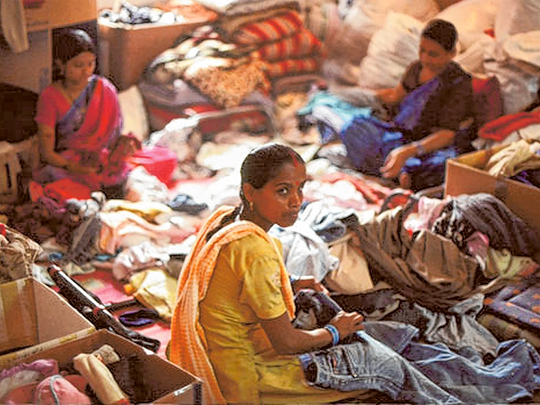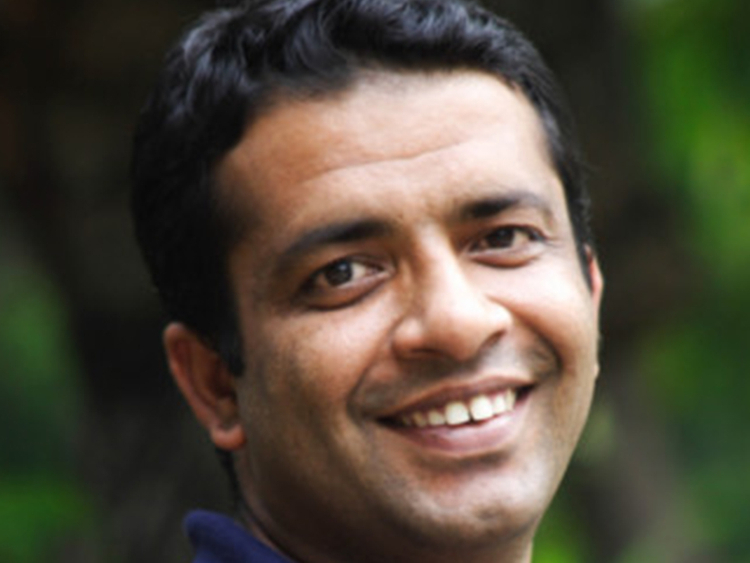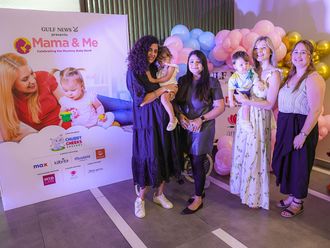
Anshu Gupta is like any other social activist. But what makes him stand out is his thought process. “In an earthquake, it is the collapsing buildings that kill people. In floods, the water kills people. But in winter, it is not the cold that kills people, but it’s the lack of adequate clothing that claims lives. So, shouldn’t lack of clothing be considered a disaster?” Gupta reasons.
Founder of NGO Goonj (meaning echo in Hindi), Gupta is co-winner of this year’s Ramon Magsaysay Award. He has been recognised for “his creative vision in transforming the culture of giving in India, his enterprising leadership in treating cloth as a sustainable development resource for the poor, and in reminding the world that true giving always respects and preserves human dignity”.
Even though countless organisations have been working on food, education and health, the most glaring oversight has been in the field of clothing. With the vision that clothes are not about vanity, but about dignity, Goonj has sought to bridge the gap between extreme poverty and affluence by making discarded material of the rich a resource for the poor. “My endeavour is to make people aware that one city can look after several villages,” Gupta says.
While millions of people across the world believe in charity, the difference lies in the manner in which goals are achieved. That’s where Gupta made a beginning. Goonj, founded in 1999, gave recycling a whole new meaning. “What in other peoples’ eyes is waste, I consider it a resource. And that resource is provided to people in dire need of it in remote villages across India,” he says.
The eldest of four siblings, Gupta studied at the Indian Institute of Mass Communication and then did his masters in Economics at Delhi University.
“As a student of mass communication, I often went to Old Delhi to get unusual stories. On a cold December night, I met a professional ‘unclaimed body collector’ and accompanied him to collect an unidentified body. Wearing a thin cotton shirt, the man had presumably died of cold. It jolted me and I realised the basic need and importance of clothing, which was often overlooked and brought to the fore only as a disaster-relief measure,” he says.
The night changed Gupta’s life. He deliberated working on humanitarian aid and clothing for underprivileged people. The turning point came when he left his job as manager with an automobile manufacturer, Escorts, and decided to pursue Goonj with a small finance base out of his own provident fund.
The humble beginnings took off from Gupta’s two-bedroom rented apartment in south Delhi’s Sarita Vihar. Goonj began its operations with just 67 items of clothing gathered from family, relatives and his own and wife Meenakshi’s collection — some of which they had not worn for the past few years.
Today, Goonj is a movement with no geographical boundaries. Operational in 21 states, it transfers over 1,000 tonnes of used clothes, household goods and other essential items annually, from cities to various states, including the most vulnerable villages in Bihar, West Bengal, Assam, Madhya Pradesh, Rajasthan, Gujarat, Karnataka, Andhra Pradesh, Odisha, Jammu & Kashmir and Maharashtra.
“As with any venture, initially it was tough explaining the concept and to motivate people in offices and homes to donate everything that was of no use to them. The items included clothes, footwear, stationery, toys, utensils and medicines. We encouraged children not to throw away their old water bottles, lunch boxes, etc. These were collected and sent to schools in rural areas,” he says.
The idea had struck him while travelling in Tamil Nadu and seeing children in some villages walking kilometres to school and not having access to drinking water on the way. While fulfilling these needs gave him immense pleasure, it also boosted his morale.
As for clothes, Gupta did not want to give them as an act of charity. “It strips people of self-respect,” he says. Thus, Goonj started a programme called Cloth for Work. People receive clothes in lieu of repairing roads, digging wells, recharging water ponds and building bamboo bridges in remote villages.
Clothes and other items are collected from all over the city and suburban areas and brought to Sarita Vihar. The system is well-managed with extreme efficiency in its operations. The NGO uses a colour-coded sorting system that is run by people around India, regardless of their education.
Hundreds of people sort, grade, sterilise and match these clothes. These are then washed and checked for damage. Once the damaged clothes are repaired, they are sorted and packed in large gunny bags. However, care is taken in sending stuff to states depending on climate and other factors.
“Compared to men in the cities, their rural counterparts are generally thin, which means the clothes need to be re-sized. Similarly, while many women in cities wear jeans, T-shirts and western outfits, women in rural areas wear saris or salwar-kameez. So, all these conditions have to be taken into account,” Gupta says.
The NGO makes use of everything it receives. While saris and woollens, which have the highest demand, are repaired, jeans are turned into school bags and T-shirts into undergarments. Zips and buttons are taken out of useless material and used in mending clothes and other products.
From time to time, Goonj has made valued additions. It worked on one of the most important jobs — that of producing affordable sanitary napkins for the poor. “Many women use the dirtiest pieces of cloth. Since hand pumps in rural areas are in public places, they hesitate to wash them. Women are known to use jute bags, dry leaves or grass — anything that is absorbent. That’s why infections are common,” Gupta says.
The NGO ensures that scraps of clothes that cannot be used are not discarded, but made use of by recycling and turning them into sanitary pads. Goonj sterilises cotton clothes, cuts them into pieces and packs them as sanitary napkins for rural, poor women under its award-winning programme Not Just a Piece of Cloth.
Gupta says he’s unable to fathom how some people amass huge quantities of material goods, including clothes they never use and which gather dust in wardrobes. Whereas there are others who have just one set of clothes.
“Thousands of people have supported Goonj, but an undeniable huge number is still unmindful of the sufferings of others. At the same time, while the rich are yet to take to giving away things lying unused in their homes, the poor too need to understand that they should fulfil their needs by working and getting paid rather then believing in free handouts,” he says.
In an enterprising show of work, there’s a whole lot of respect associated with the entire supply chain — from those who give clothes to those who sort and pack them and the people who receive them.
Gupta has learnt his lessons with experience. Having assisted in many disaster relief efforts, he says, “I have avoided making the mistake of distributing stuff in a way that could be degrading for people.”
During the 1991 earthquake in Uttarkashi in North India, he witnessed villagers rejecting bundles of clothing that were thrown at them from trucks. He found people wearing rucksacks rather than suffering the indignity.
Again, in 2004, when tsunami struck Chennai, he discovered huge consignments of goods that were sent mindlessly and were of no use to the victims. He helped sort through a number of trucks of donated clothing. Among the first 100,000 units, he found over a thousand woollen caps. Given the warm climate of South India, they were of no use to the people there.
“Everyone in the world has the right to live in a dignified manner and not just for survival. That’s why Goonj’s entire programme is based on giving in a noble way,” he says.
For his innovative style of work, Gupta and Goonj have won several national and international awards, including Ashoka Fellowship (2004), The Good Practices Dubai International Award (2007), World Bank Global Development Marketplace Award (2007), Innovation for India (2010), Forbes India’s Most Powerful Rural Entrepreneurs (2010), GDN-Japanese Award (2012), Game Changing Innovation by NASA and US State Department (2012), Global Green Innovations (2014). Gupta was also listed among Asia’s Top 10 social entrepreneur (2014).
“Awards are a step towards recognising what were earlier considered non-issues. Hopefully, more people will understand what we do,” Gutpa says.
Nilima Pathak is a journalist based in New Delhi.













